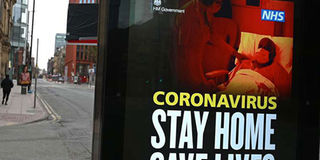Police under fire in virus crisis, but public’s conduct despicable

An information board displays a message encouraging people to stay at home in a near-empty street in Manchester on April 4, 2020, as life in Britain continues during the nationwide lockdown to combat the coronavirus pandemic. PHOTO | OLI SCARFF | AFP
What you need to know:
- Derbyshire police went further and used drones to film people parking their cars and then going for walks in the hilly Peak District.
- New guidance has been offered by the National Police Chiefs’ Council on how police must use their emergency powers.
Protests against the use of drones and complaints of heavy-handedness by police during the UK’s coronavirus crisis might seem of little significance to Kenyans who have suffered physical assaults by their curfew-enforcing police.
However, the unprecedented nature of the lockdown and draconian laws governing movement and behaviour have alerted some Britons to the fragility of civilisation’s fabric.
On an individual basis, there are daily reports of selfish and outlandish behaviour. The supermarket in a village near me was offering free coffee. When it ran out, one man, arriving late, went berserk and spat at the assistants.
In the same supermarket, a customer brandished a knife when a fight erupted over toilet rolls. The incidents were captured on CCTV and the men will be arrested the next time they appear in the shop.
In Sunderland, a 60-year-old man was arrested for making repeated 999 calls — five in 24 hours — to complain to police about the National Health Service and coronavirus.
ESSENTIAL TRAVEL
Among the new restrictions is a ban on non-essential travel, but in Cheshire, a man made a 220-mile round trip in his car to pick up windows worth £15 (Ksh1,951), which he had bought on eBay.
Police who stopped the car said the windows were inside the car and the man’s wife was in the boot.
Roadblocks have been set up in some parts of the country, with police stopping drivers to check their journeys are for essential purposes.
Derbyshire police went further and used drones to film people parking their cars and then going for walks in the hilly Peak District. They also released black dye into a local lake to deter sightseers.
A former Justice of the Supreme Court, Lord Sumption, told the BBC such actions were disgraceful and “shamed our policing traditions”.
He said: “The tradition of policing in this country is that policemen are citizens in uniform, they are not members of a disciplined hierarchy operating just at the government’s command.”
POLICE STATE
There were also reports that some people had been fined £60 on the spot for going out to buy goods which the police considered not essential, and that others had been fined for going for a drive due to boredom.
Transport Minister Grant Shapps said there had been “one or two instances” of police being heavy-handed but in the main officers were being sensible.
The West Midlands police chief, David Thompson, said arguments that Britain was becoming a police state were “widely off the mark”.
In a series of tweets, he said: “Police officers and staff are doing their best and the public are following their advice; the use of power is minimal.
“There have been a small number of cases where things could have been done differently. However comments re a police state are widely off the mark…. the police are doing a marvellous job in difficult circumstances.”
NEW HOSPITAL
New guidance has been offered by the National Police Chiefs’ Council on how police must use their emergency powers, primarily to co-ordinate their efforts and take a consistent approach.
Meanwhile, the fight against the virus goes on, highlighted by the construction of a field hospital able to treat 4,000 patients.
Said to be the biggest hospital in the world, the Nightingale Hospital was constructed within the Excel arena in London’s Docklands areas in the space of a week.
It will treat patients in need of intensive care but with the best chance of survival; anyone with a serious underlying condition, such as a heart, kidney or vascular problems, will go to one of London’s regular hospitals.
* * *
There’s an upside to the crisis, too, when some people do the nicest things.
Paper vendor Sophie Turner, 14, saw a sign on a door saying the lady inside had underlying medical conditions and was self-isolating and could not see anyone. She was 84 years old and also grieving for her late husband.
Sophie said, “I have never met her but I deliver her paper six days a week. I thought it was sad and it would be nice to cheer her up.”
So Sophie popped a Dairy Milk chocolate bar through the old lady’s door and a note saying, “Hope you are OK.”
The lady’s daughter, Elizabeth Outhwaite, said, “I found the note and the chocolate in mum’s letter box. They gave us a happy moment and we are very grateful.”
* * *
I heard a doctor say that to get through the boredom of self-isolation, we should finish things we have started and thus bring calm into our lives.
So I looked through the house for things I had not yet finished. I then polished off a bottle of whisky, a bottle of red wine, a bottle of white wine, a bottle of beer and a box of chocolates.
You have no idea how calm I feel right now.





